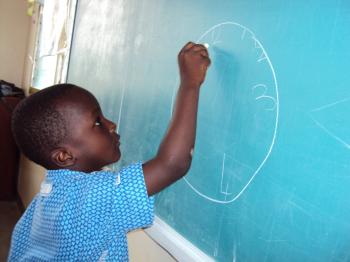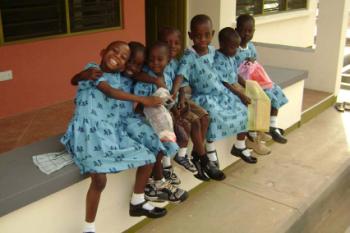Rapid urbanisation and lack of employment opportunities

Kumasi is the capital of the Ashanti Region and the second largest city of Ghana, with approximately 1.5 million inhabitants. It is situated 250km north-west of Accra. Due to its central location, Kumasi established itself as an important trade hub for gold, cocoa and wood. Rural poverty remains widespread in Ghana, and Kumasi, as a big economic centre, attracts a lot of people who hope to find a job, even if it is only a temporary one.
However, this rapid urbanisation brings many problems. More often than not, people are unable to find work once they arrive in the city. Living conditions for many are unsafe and unsanitary, and running water and electricity are by no means a given. Unemployment also severely affects the young people in Kumasi. Young men and women can be seen hanging around on the streets, trying to scrape a living by selling some merchandise. Not only is this kind of life hardly rewarding, it is also dangerous as street vendors often suffer traffic injuries or are subjected to violence.
Poverty always hits children the hardest
Girls from the northern regions of the country are expected to marry between the ages of 15 to 17 and traditionally they must bring household items into the marriage. When the girls are from poor families, they may not be able to afford these, so they migrate to the city to try and raise some money, which, in turn, exposes them to a great number of dangers. Early marriage and early motherhood are also common.
What we do in Kumasi

SOS Children’s Villages began working in Kumasi in 2008. It is located in Asokore Mampong, a little town in the suburbs of Kumasi. For children from the region who are no longer able to live with their parents, twelve SOS families can provide a loving home for up to 120 children. In each family, the children live with their brothers and sisters, affectionately cared for by their SOS mother.
The children attend the SOS Kindergarten together with children from the local community. This way, we ensure that children who grow up in the SOS Children’s Village are integrated into the local community from a young age. The children then go on to complete their primary education at the SOS Hermann Gmeiner School, where up to 210 pupils from the region are taught.
There is also an SOS Medical Centre here, which treats up to 12,000 members of the community each year. It provides basic health services, such as treatment of infectious and non-infectious diseases, to people who would otherwise not be able to afford medical care.
Integrated into the medical centre there is an SOS Social Centre which provides a family strengthening programme to members of the community, aiming to support them in a holistic and sustainable manner. Its services include providing information on prevention of illnesses, providing social and material assistance to families in need, and offering advice on child education, as well as career guidance for parents.